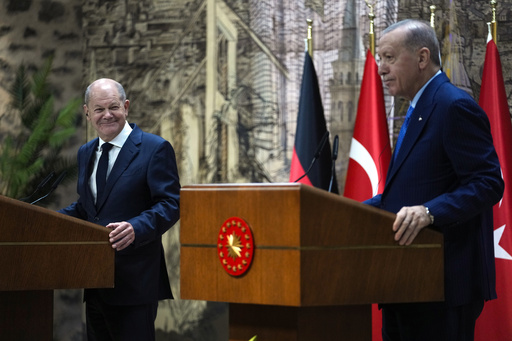ISTANBUL — In Istanbul on Saturday, Turkish President Recep Tayyip Erdogan and German Chancellor Olaf Scholz convened to discuss various matters of mutual interest and explore avenues for collaboration. However, the two leaders found themselves at odds over their perspectives on Israel.
During a largely amicable press brief following their discussions, Erdogan expressed severe criticism of Israel and its allies in the West. He stated, “It is evident that Netanyahu aims to broaden the scope of conflict beyond a selective, extremist group, essentially seeking to escalate the situation.” He further commented on the fatalities of influential figures, suggesting that Western leaders appeared to delight in the tragedies unfolding.
Conversely, Scholz defended Israel’s “right to self-defense” and directly rejected Erdogan’s characterization of the situation in Gaza as “genocide.” He emphasized Germany’s support for humanitarian assistance in Gaza, advocating for a two-state resolution and negotiations for a ceasefire. “Germany does not consider the genocide claim to be substantiated,” Scholz asserted, while acknowledging the emotional weight of civilian casualties, particularly children. He highlighted that genocide is fundamentally a “legal question.”
Despite their differing viewpoints regarding Israel, both leaders maintained a congenial atmosphere during their press encounter. Their meeting was timely, given that both countries require support from one another. Turkey’s primary objective is acquiring military equipment from Europe, notably the Eurofighter Typhoon jets. Scholz indicated that positive developments in this area might be on the horizon, stating, “As a NATO member, Turkey is always part of our decision-making when it comes to specific arms deliveries. This is a standard practice, and we have made similar decisions recently that are set to be acted upon.”
Not long before Scholz’s visit, his government revealed an increase in arms exports to Turkey, as reported by a local news agency. Up until mid-October, 69 permits valued at around 103 million euros (approximately $111.7 million) had been granted, including military equipment worth about 840,000 euros ($911,000). After a significant drop in arms exports following Turkey’s failed coup attempt in 2016 and its incursion into northern Syria, Germany had resumed a more robust arms export dynamic.
While Turkey is keen on fortifying its defense capabilities, Scholz is hoping to gain Turkey’s assistance in the deportation of rejected asylum-seekers and migrants to Turkey. As of late September, nearly 16,000 Turkish nationals living in Germany were ordered to leave. The Berlin administration is also looking to facilitate the deportation of individuals with criminal records back to Afghanistan and Syria, and it seeks Turkey’s cooperation, amongst other partners, for these efforts.
